Faculty Bios


Faria Amjad, MD
Dr. Faria Amjad is director of the Spasticity Clinic at MedStar Georgetown where she manages spasticity affecting the upper or lower extremities using medications, botulinum toxin and intrathecal baclofen pumps. She is also the director of clinical trials involving autoimmune disorders affecting the nervous system.
Board-certified in neurology, Dr. Amjad completed her undergraduate degree, medical degree, neurology residency and fellowship in multiple sclerosis all at Georgetown. During her two-year multiple sclerosis fellowship, Dr. Amjad focused on how to diagnose and manage patients with MS and other autoimmune disorders affecting the nervous system.
Given her long standing affiliation with Georgetown and its core values of service, Dr. Amjad hopes to use her medical training and knowledge to make a meaningful impact on the lives of patients and their families affected with multiple sclerosis. She feels fortunate to practice at a time when physicians have so much hope to offer patients with multiple sclerosis a disease that is chronic and can be debilitating in terms of therapeutics and alternative medicine.
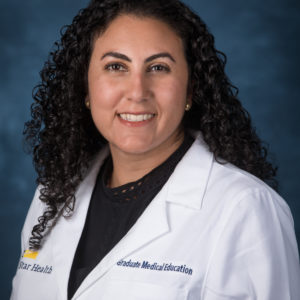
Petra Brayo, MD
Dr. Petra Brayo is a board-certified neurologist who is currently completing her second year of Neuroimmunology and Multiple Sclerosis fellowship. As a clinical research fellow, she splits her time between taking care of patients with multiple sclerosis and other autoimmune neurological conditions, leading educational sessions for Georgetown University School of Medicine students, and pursuing a number of research projects. She completed her neurology training at Duke University Medical Center, serving as a chief resident during her last year. She attended medical school at the Lewis Katz School of Medicine at Temple University, where she also earned a master’s degree in Urban Bioethics and Health Policy. She has a clinical and research interest in Myelin Oligodendrocyte Glycoprotein Associated Disease (MOGAD), as well as exploring barriers to access to specialty MS and Neuroimmunology care.
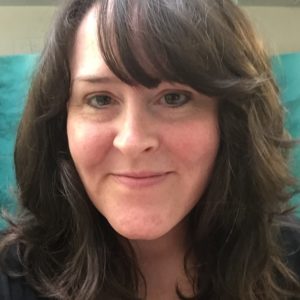
Kimberly Foster, MSW, LICSW
Kimberly Foster, MSW, LICSW, has a Master’s Degree in Social Work from Boston College. She is a Licensed Independent Clinical Social Worker in Washington, D.C. and a Licensed Clinical Social Worker in Virginia. Her work experience ranges from child welfare, to victim services, to hospital social work. Kim was our MS and Neuroimmunology Clinic social worker until August 2022. She is currently taking time to travel the world and just returned to the States from Spain and Portugal.
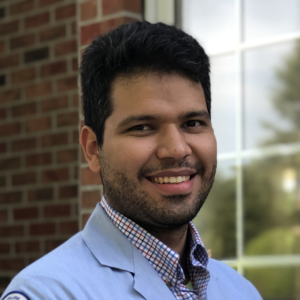
Luis Manrique-Trujillo, MD
Dr. Luis Manrique is a neurologist who was awarded with the first-of-its-kind EMD Serono I’M IN fellowship program that is dedicated to reducing disparities in neurologic care for MS patients, thereby advancing diversity, inclusion and equity in healthcare. He is planning to complete 2 years of training in MS and Neuroimmunology at Georgetown to become an expert in diagnosing and managing a broad spectrum of debilitating conditions and he is also interested in studying the neurological disparities in the Washington DC Metropolitan area affecting the Latinx population. He graduated from medical school back in 2014 at Universidad de Los Andes in Bogota Colombia and worked a couple of years as a general practitioner. Afterwards he moved to the U.S. in 2018 to start his neurology residency in the Midwest at the University of Illinois at Peoria.
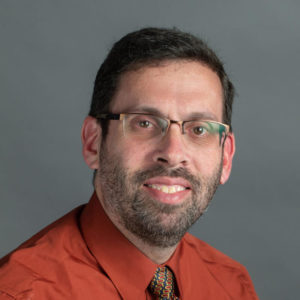
Benjamin Osborne, MD
Associate Professor, Departments of Neurology and Ophthalmology
Vice-Chair of Resident Education, Department of Neurology
Director, Neuromyelitis Optica and Neuro-Ophthalmology Clinics
Director, Multiple Sclerosis Fellowship Program
Dr. Osborne is board certified in neurology, with concentrations in Neuro-Ophthalmology and Multiple Sclerosis. Dr. Osborne evaluates and treats patients with complicated vision problems including multiple sclerosis, myasthenia gravis, pseudotumor cerebri, thyroid eye disease, unexplained vision loss, optic neuritis and papilledema. Dr. Osborne and his team participate in visual field testing and optic coherence tomography (OCT). He has published numerous works in journals in his fields and is currently active in multiple ongoing research studies.
Education:
- Fellowship Program: University of Pennsylvania Hospital (2006)
- Residency Program: MedStar Georgetown University Hospital (2005)
- Internship Program: Maimonides Medical Center (2002)
- Medical School: Drexel University College of Medicine (2001)

Elizabeth Parker, MS, CTRS, RRT
Elizabeth Parker, MS, CTRS/RRT is a Recreation Therapist in The Adaptive Sports and Fitness program at MedStar National Rehabilitation Hospital which helps to maximize participation for individuals with disabilities in recreational and competitive sports. Through these programs, participants are able to build self-confidence, improve health and well-being, and gain greater independence.
Our programs are open to anyone with a physical disability at no cost. We provide coaching, training, equipment, and travel assistance in nine sports. We provide circuit training, open gym, and cardio fitness classes both at the hospital and in the community. We also host adaptive sports tournaments and special events throughout the year. Our coaching staff, personal trainers, and volunteers are highly qualified, well trained, and ready to assist you.

David Pisfil
David Pisfil joined the Neurology Department at Georgetown University Medical Center in 2018. He is a clinical research coordinator who primarily manages trials investigating Multiple Sclerosis (MS) and Neuromyelitis Optica Spectrum Disorder (NMOSD). Before joining the research team, David earned a master’s degree in physiology at Georgetown University. David is passionate about volunteering with the Special Olympics and as an English/Spanish interpreter at a local free clinic. On weekends, you might find David jogging along the Potomac River – one of his favorite pastimes! If you are interested in learning more about our clinical trials, please contact David at 202-681-8127 or ddp39@georgetown.edu.

Victoria Reese
Victoria Reese is the Co-Founder & CEO of We are ILL. With impressive entertainment and advertising experience under her belt, paired with an innate talent for branding, Victoria Marie Reese is on a mission to curate an authentic brand experience, tailored to her clients’ needs. Within three years of forming her company, the Brand Architect, she built a portfolio of industry giants like Nike, Toyota, and Unilever, as well as ordinary people who “trust [her] to cultivate their ideas and turn them into reality.”
Victoria has been laying the pavement for her success since Howard University and has since achieved and even surpassed her goals. In 2015, before her company turned two, she was featured in Black Enterprise magazine, garnered national recognition for her multiple sclerosis (MS) campaign, #WeAreILLmatic on social media, and she successfully launched, BAUS, an online store that ignites and empowers its customers to pursue their passions.
Victoria’s gift of storytelling doesn’t end in the digital landscape, though. Not only has she hosted sold-out webinars, but she has also carved out space as a sought-after motivational speaker, showing the world how being a “victor” has shaped her success.
It’s her keen eye for detail that makes Victoria an in-demand asset to people and brands and her go-hard attitude that makes her a mascot for resilience. As a Black woman with MS, she shows up for her community, aiming to bring more representation to research, advocacy, and education surrounding the chronic disease.
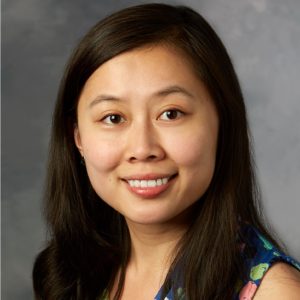
Amy Safadi, MD
Dr. Amy Safadi is currently completing her neuroimmunology/multiple sclerosis fellowship through a scholarship funded by the National Multiple Sclerosis Society. She completed her neurology residency program at MedStar Georgetown University Hospital where she also served as Chief Academic Resident. She attended medical school at Stanford University School of Medicine. Currently, she is developing expertise to treat patients with a wide range of neuroimmunological conditions ranging from multiple sclerosis to neuromyelitis optica, MOG antibody disease, neurosarcoidosis, etc. She is actively involved in several research projects and has presented her research in multiple national and international conferences.

Robert Shin, MD
Robert K Shin, MD, FANA, FAAN, is a graduate of Yale University and received his medical degree from the University of Pennsylvania School of Medicine. He completed a neurology residency and fellowships in neuro-ophthalmology and multiple sclerosis at the Hospital of the University of Pennsylvania.
Dr. Shin is currently Professor of Neurology at MedStar Georgetown University Hospital and Director of the Georgetown Multiple Sclerosis and Neuroimmunology Center. Dr. Shin has a special interest in health disparities in multiple sclerosis (MS) as well as visual problems associated with MS and other demyelinating disorders, including neuromyelitis optica spectrum disorder (NMOSD).
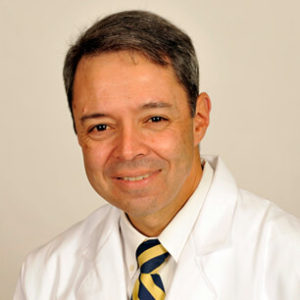
Carlo Tornatore, MD
Professor and Chair, Department of Neurology, Georgetown University School of Medicine
Executive Director, Multiple Sclerosis Patient Centered Specialty Practice
Regional Director of Neurology, MedStar Health
Dr. Tornatore received his undergraduate degree in neurobiology from Cornell University and then attended Georgetown University School of Medicine where he received his medical degree. Following a Neurology Residency at Georgetown University Hospital, he was a post-doctoral fellow at the National Institute of Neurologic Disorders and Stroke at the National Institutes of Health. Dr. Tornatore has published extensively in the areas of neuroimmunology, neurovirology and Multiple Sclerosis and is currently involved in over 15 clinical trials for the treatment of Multiple Sclerosis. He has won multiple awards in the areas of medical student teaching, patient care and scholarly research.


